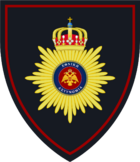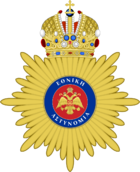National Police (Romaia): Difference between revisions
mNo edit summary |
mNo edit summary |
||
| Line 61: | Line 61: | ||
| secret = | | secret = | ||
| overviewtype = | | overviewtype = | ||
| overviewbody = [[Ministry of Interior (Romaia|Ministry of Interior]] | | overviewbody = [[Ministry of the Interior (Romaia)|Ministry of the Interior]] | ||
| headquarters = | | headquarters = | ||
| hqlocmap = | | hqlocmap = | ||
| Line 130: | Line 130: | ||
Alongside the [[National Gendarmerie (Romaia)|Gendarmerie]], it is the main police force for providing police duties, primarily to cities and large towns, and with its child agencies it is also responsible for highway patrol, railways, airports, borders (together with [[Customs (Romaia)|customs]]) as well as certain waterways, and assisting the local police forces. | Alongside the [[National Gendarmerie (Romaia)|Gendarmerie]], it is the main police force for providing police duties, primarily to cities and large towns, and with its child agencies it is also responsible for highway patrol, railways, airports, borders (together with [[Customs (Romaia)|customs]]) as well as certain waterways, and assisting the local police forces. | ||
The National Police is the country's main police force for the maintenance of public security and as such it is run directly from the General Directorate of Public Security, and the keeping of public order with primary jurisdiction in cities and large towns. By contrast, the [[National Gendarmerie (Romaia)|National Gendarmerie]] has primary jurisdiction in smaller towns, as well as in rural and border areas. The National Police comes under the jurisdiction of the Ministry of the Interior and has about 167 thousand employees (as of 2016). | The National Police is the country's main police force for the maintenance of public security and as such it is run directly from the General Directorate of Public Security, and the keeping of public order with primary jurisdiction in cities and large towns. By contrast, the [[National Gendarmerie (Romaia)|National Gendarmerie]] has primary jurisdiction in smaller towns, as well as in rural and border areas. The National Police comes under the jurisdiction of the [[Ministry of the Interior (Romaia)|Ministry of the Interior]] and has about 167 thousand employees (as of 2016). | ||
The National Police operates mostly in cities and large towns. In that context, it conducts security operations such as patrols, traffic control and identity checks. Under the orders and supervision of investigating magistrates of the judiciary, it conducts criminal inquiries and serves search warrants. It also maintains specific services ('judicial police') for these inquiries. | The National Police operates mostly in cities and large towns. In that context, it conducts security operations such as patrols, traffic control and identity checks. Under the orders and supervision of investigating magistrates of the judiciary, it conducts criminal inquiries and serves search warrants. It also maintains specific services ('judicial police') for these inquiries. | ||
Revision as of 12:23, 24 October 2022
This article is incomplete because it is pending further input from participants, or it is a work-in-progress by one author. Please comment on this article's talk page to share your input, comments and questions. Note: To contribute to this article, you may need to seek help from the author(s) of this page. |
| National Police Εθνική Αστυνομία | |
|---|---|
 Shoulder insignia | |
 Logo | |
| Common name | Αστυνομία |
| Abbreviation | Ε.Α. |
| Agency overview | |
| Formed | 4 July, 1854 |
| Employees | 167,200 (2016) |
| Annual budget | £7,23 billion (2020) |
| Jurisdictional structure | |
| National agency | Romaia |
| Operations jurisdiction | Romaia |
| Governing body | General Directorate of Public Security |
| General nature | |
| Operational structure | |
| Overviewed by | Ministry of the Interior |
| Website | |
| astynomia.ra | |
The National Police (Greek: Εθνική Αστυνομία, Ethnikí Astynomía, abbreviated Ε.Α.) is one of the national police forces of Romaia.
Alongside the Gendarmerie, it is the main police force for providing police duties, primarily to cities and large towns, and with its child agencies it is also responsible for highway patrol, railways, airports, borders (together with customs) as well as certain waterways, and assisting the local police forces.
The National Police is the country's main police force for the maintenance of public security and as such it is run directly from the General Directorate of Public Security, and the keeping of public order with primary jurisdiction in cities and large towns. By contrast, the National Gendarmerie has primary jurisdiction in smaller towns, as well as in rural and border areas. The National Police comes under the jurisdiction of the Ministry of the Interior and has about 167 thousand employees (as of 2016).
The National Police operates mostly in cities and large towns. In that context, it conducts security operations such as patrols, traffic control and identity checks. Under the orders and supervision of investigating magistrates of the judiciary, it conducts criminal inquiries and serves search warrants. It also maintains specific services ('judicial police') for these inquiries.
History
Mission
The mission of National Police responsibilities can be described as protection of the state, safeguarding the rights and freedoms of citizens, supervising the maintenance of public order, maintaining public safety, providing assistance to public entities and private in the event of accidents and disasters as well as the peaceful resolution of disputes between private individuals. It also deals with the training and education, at its facilities, of members of other police bodies especiality departments include the Traffic, Railway, Communications Police, the Mobile Departments and the Scientific Police.
Strength
The National Police has an authorised strength by law of 200,000 people. However, there are approximately 160,000 people of which 16,000 are women. Just under 8,000 employees are civilian support personnel with technical skills who provide logistic and technical support. In 2005 the National Police contained 168,324 members.
Approximately 2,000 officers are assigned to the "neighbourhood police" service, which has a police presence on the streets and deters crime. Pairs of policemen patrol areas of major cities on foot.
Organisation
The headquarters of the National Police are in Constantinoupoli and its chief is referred to as the Director of the National Police (Greek:Διευθυντής Εθνικής Αστυνομίας) with official Rank of Director of the Police – Secretary General of the Public Security (Greek:Διευθυντής Αστυνομίας – Γενικός Γραμματέας της Δημόσιας Ασφάλειας). The Director of the State Police is also the Honorary President of the National Association of the National Police (Εθνική Ενωση της Εθνικής Αστυνομίας). The Director is responsible to the Minister of the Interior.
The National Police is sub-divided into directorates, which are further composed of sub-directorates:
- Διεύθυνση Πόρων και Αρμοδιοτήτων της Εθνικής Αστυνομίας (Directorate of Resources and Competences of the National Police)
- Διεύθυνση Δικαστικής Αστυνομίας (Directorate of the Judicial Police): charged with all criminal investigations under direction of magistrates. The main Sub-Directorates of the Judicial Police are:
- Διεύθυνση Δημόσιας Ασφάλειας (Directorate of Public Security): Patrol and response duties, misdemeanour investigations, emergency help. The DCSP is the National Police's equivalent of the Departmental Gendarmerie.
- Central apparatus (Κεντρικά γραφεία')
- Departemental directorates in Romaia (sing. Τμηματική Διεύθυνση Δημόσιας Ασφάλειας),.
- Directorate of Border Police (Διεύθυνση Συνοριακής Αστυνομίας): performs identity checks with customs and handles illegal immigration.
- General Inspectorate of the National Police (Γενική Επιθεώρηση Εθνικής Αστυνομίας): headed by the Inspector General and responsible for internal affairs.
- Technical International Police Co-operation Service' (Υπηρεσία Τεχνικής Διεθνούς Αστυνομικής Συνεργασίας).
